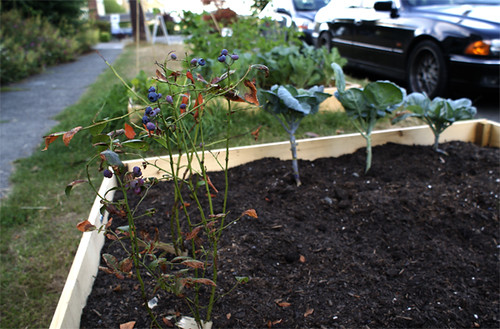
Green thumbs up! Capitol Hill urban farming just got a little easier. And we already have the fashion to make it work. You still have to till your own p-patches and clean your own coops but the Seattle City Council has loosened restrictions on urban gardens and farming as part of what the City of Seattle is calling the Year of Urban Agriculture.
Council Bill 116907 comes as a response to the increasing popularity of urban agriculture. Urban farmers may now keep up to eight chickens with some exceptions allowing for more on larger lots. However, new roosters are prohibited. Your old rooster? He’s grandfathered in.
“These code changes will strengthen our community food security,” said City Council president Richard Conlin in an August 16 press release from the city. “This is one more action that supports the goals of the Local Food Action Initiative: increases opportunities for Seattle residents to purchase and grow healthy food in the city.”
Other new rules include a height exception to allow rooftop gardens to add green houses, looser restrictions on small urban farms and farmers markets that will allow them in residential areas of the city and city residents will now be allowed to sell their produce.
The Seattle Department of Transportation last summer decided to get some dirt under its nails too. Permits are no longer required to plant parking-strip (that patch of grass between the sidewalk and the street) gardens where previously, planting anything but grass seed in the strip would cost you an average of $225. However, hardscaping like adding stepping stones still requires a permit from SDOT but there is no charge.
Last year, SDOT granted 22 parking-strip garden permits and this year 52 permits have been granted for hardscaping alone, as reported by the Seattle Times.
The Feds have also given a nod to the Seattle farming community in the form of a $300,000 grant from the Department of Agriculture to support further expansion of urban agriculture and increasing access to healthy food in low-income communities. Produce from new gardens created under the grants will support both gardeners and local food-banks.
Two local groups are primed to be part of the friendlier environment for urban farming. The Howell Collective (http://howellcollective.wordpress.com/ ) is ready to unveil their p-patch project as part of the grand opening of Seven Hills Park later this week and alleycat acres (http://www.alleycatacres.com/ )continues its work at 22nd Ave and Union to create a sustainable urban farming collective.
Seattle City Council approves urban farm and community garden legislation improving access to locally grown food
Seattle – As part of the 2010 Year of Urban Agriculture, the Seattle City Council approved Council Bill 116907that supports the rapidly growing local food movement. The ordinance updates the City’s Land Use code governing urban agriculture uses, including allowing “urban farms” and “community gardens” in all zones, with some limitations in industrial zones. Also, residents will now be able to sell food grown on their property.
“These code changes will strengthen our community food security,” said Council President Richard Conlin, sponsor of the ordinance. “This is one more action that supports the goals of the Local Food Action Initiative: increases opportunities for Seattle residents to purchase and grow healthy food in the city.
“This is an exciting time to be an urban farmer,” said Nicole Jain Capizzi, owner of Amaranth Urban Farm in Rainier Beach. “I recently moved to Seattle to start an urban farm and am encouraged by the City’s on-going actions that strengthen Seattle’s food system.”
This legislation formally recognizes Farmer’s markets allowing them in more areas of Seattle. The ordinance also allows dedicated food production on rooftop greenhouses with a 15 foot exemption to height limits in a variety of higher density zones.
“The code changes related to rooftop greenhouses are a bold step toward high-yield food production in an urban environment,” stated Branden Born, Associate Professor of Urban Design and Planning at University of Washington. “The Seattle City Council is again on the forefront of initiatives that show a true commitment to improving access to healthy food.”
The legislation improves the number of chickens allowed per lot from three to eight, with additional chickens allowed for large lots associated with community gardens and urban farms. The legislation prohibits new roosters and sets boundaries for chicken coops, ten feet away from primary residential structures. Existing chicken coops built prior to the code changes will remain legal.
More information on raising chickens in the city can be found at: http://www.seattle.gov/council/urbanagriculture/chickens_in_city.htm


